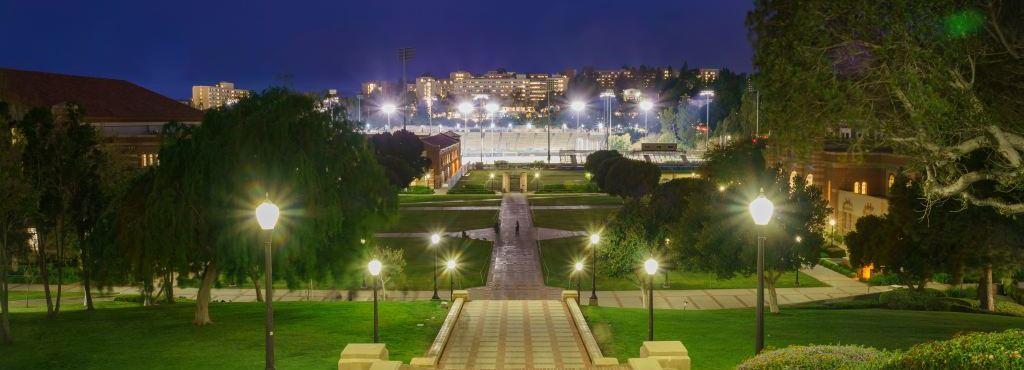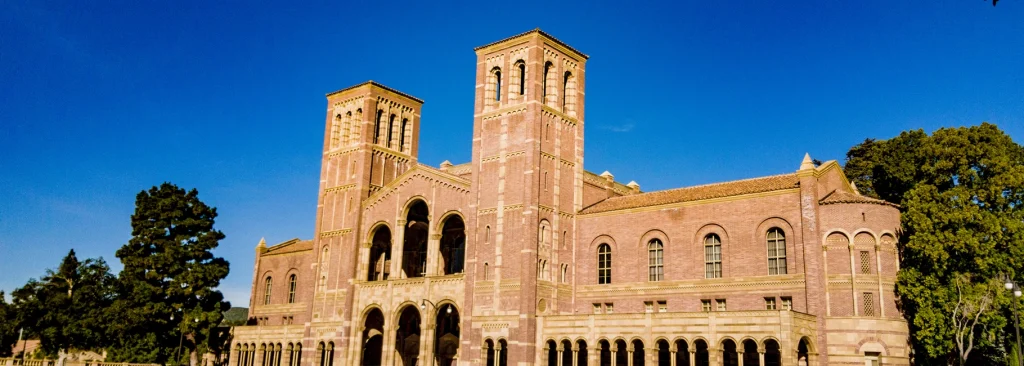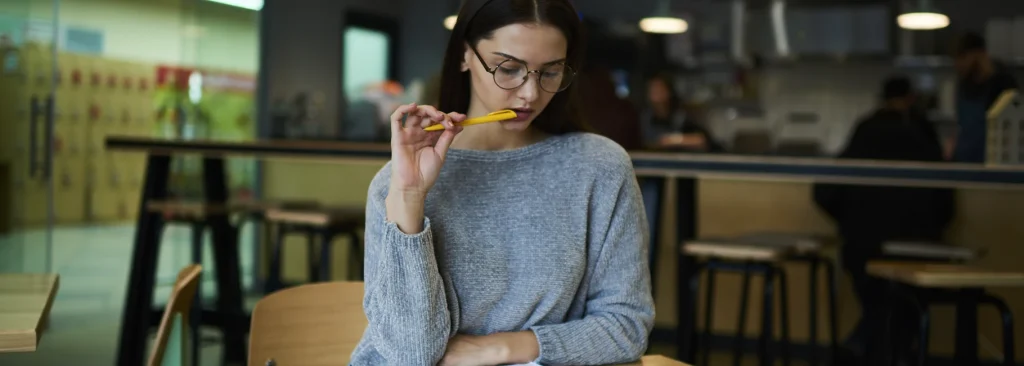UCLA is part of the University of California system, which is comprised of 10 campuses throughout the state. Students applying to UCLA must use the UC application — the University of California system does not use the Common App or Coalition Application. The application process includes several personal statement prompts, or what UC refers to as personal insight questions. Keep reading to learn more about these prompts and tips for responding to them.
Does UCLA Need a Personal Statement?
For admission to any of the University of California schools, including UCLA, you are required to respond to the personal statement prompts, which becomes part of the holistic review. What does holistic review really mean?
IvyWise counselor Tiffany explains, “holistic review really means and acknowledges that there are multiple parts of your personality, your talents, and your application — and the admissions office is willing to consider each of those areas.” The UCLA essays provide insight into who you are beyond how you perform in the classroom. It helps the admissions committee picture how you will contribute to the campus community.
UCLA Personal Statement 2025
Well-crafted essay responses may give you an edge over another strong candidate with comparable academic performance. Taking the time to research how to get into UCLA and including specific and relevant details in your responses will make your personal statements much stronger. According to the University of California, your responses to the personal insight questions “provide context for the rest of your application.”
How Long Is the UCLA Personal Statement?
The UC system provides eight personal insight questions for the 2025-26 admissions cycle. You are required to respond to four of them. Each response should be 250 to 350 words. Review the questions carefully and choose the four that you feel are the most relevant to your circumstances and life experience.
Why Is UCLA So Hard to Get Into?
UCLA receives more applications than any other college or university in the U.S., making it highly competitive. The UCLA acceptance rate is around 9%, making it one of the most selective schools in the UC system. For the class of 2029, the acceptance rate was 9.60% for in-state students, 11.19% for out-of-state students, and 6.43% for international students with an overall admission rate of 9.42%.
To be competitive, your application should emphasize the three most important factors for UCLA admissions officers: the rigor of your high school coursework, your GPA, and your personal insight essays. Other factors — such as extracurriculars, volunteer/work experience, personal qualities, and talents/skills — are also important but not given as much weight.
What Does a Good Personal Statement Look Like?
It takes time and practice to learn how to write a personal statement that’s compelling and competitive. Your essays should demonstrate your intellectual curiosity, a positive attitude, and the personal characteristics that make you a good fit for UCLA. It’s an opportunity to highlight the educational and personal experiences that shaped you as well as your talents and skills — all of which demonstrate how you will contribute to the campus community both inside and outside of the classroom.
Examples of Personal Statements for UCLA
Below are the personal insight questions for the 2025-26 admissions cycle — these are the prompts for UCLA and all other schools in the UC system. There is no right or wrong way to respond to these prompts, but these examples can help you think about how to approach your own essays. Since the UC application can go to multiple University of California schools, these responses don’t specifically mention UCLA.
1. Describe an example of your leadership experience in which you have positively influenced others, helped resolve disputes, or contributed to group efforts over time.
View Example
My mind drifts as our coach yells down at us. Another tournament lost in the first round of playoffs. Was I not doing enough? On top of being bathed in sweat after every practice, I’d been working alone through hours of strength training, conditioning, and practicing.
Our disappointing tournament results spoke for themselves.
You can’t double-touch in volleyball. Thus, what is a good hitter without a capable setter to feed him? Or a reliable passer to make the set possible? My performance alone is irrelevant. Apart from skill, volleyball is also a game of trust. On the court, we played as wild and uncoordinated hyenas, tripping over ourselves and hungry for any touch on the ball. We tried to reach over and pass someone else’s ball. We mispositioned our defense in anticipation of a poor block. Our mistakes bore from trying to do too much, from distrust.
Realizing this, I first started to bring the team into my strength and conditioning sessions. I organized film sessions to review our mistakes. I communicated practice ideas with my coach based on team feedback. Most importantly, I started encouraging my teammates to take more risks. Regardless of the outcome, I relished in knowing they grew as players.
While skill is honed on the court, trust is strengthened off the court as friends. I took initiative and organized hangouts and dinners for us. Through inside jokes and shared struggles outside volleyball, we became close friends. Our trust made us consistent. It didn’t matter when someone played off. We knew our teammates would pick us up.
I had believed leadership was setting an example by being the best, wrongly expecting everyone to follow. Now, I recognize that leadership is lifting others to be their best and inspiring unity. At our first championship tournament, we had lost every single game and placed dead last. By the end of the season, we had accumulated the most medals out of any team in our club. Improvement in technical skill allowed us to compete against high-level teams. Our trust allowed us to win.
2. Every person has a creative side, and it can be expressed in many ways: problem solving, original and innovative thinking, and artistically, to name a few. Describe how you express your creative side.
View Example
As a child, I was always outside, whether it was a sunny spring day with fluffy clouds drifting overhead or overcast afternoons with the breeze rustling through the trees. The feeling of sand beneath my feet, the sound of birds chirping, and the sight of water shimmering or rippling in the wind became a natural backdrop to my days. Being immersed in nature, surrounded by wildlife, was how I grew—a way of life that shaped who I am.
My creativity is rooted in my deep connection to nature. I carefully collect blooms from my garden or the woods nearby, then press them between the pages of my creative journal. Each piece reminds me of the changing seasons, a tangible memory of a moment viewing the arrival of new colors and emotions that captivate me. Sometimes, I create layered paper art or carefully arrange autumn leaves and spring petals to form complex designs. These projects allow me to combine my love for nature with my artistic side, reflecting the beauty and impermanence of the world around me.
This creative process is not just about making art; it’s a way of thinking and problem-solving. When I create, I look at nature through a different lens, seeing patterns, colors, and textures that might otherwise be overlooked. For example, when I make stickers from peach tree blossoms, I study the petals in detail, deciding how best to represent them in a small, intricate design. It’s a form of innovative expression that brings me joy and a deeper understanding of the natural world.
I’ve applied my creative thinking in leadership roles, such as founding an educational animal club. Through the club, I organized hands-on activities like wildlife observation and environmental clean-ups, blending creativity with education to inspire others to connect with nature. Volunteering at local nature centers, I have seen firsthand how creativity can foster learning and engagement, whether crafting educational materials or learning by doing.
As I prepare for my next chapter, I am excited to share my love for nature and my creative side with others.
3. What would you say is your greatest talent or skill? How have you developed and demonstrated that talent over time?
View Example
Voice acting is my greatest passion, and the talent I’m most proud of is my ability to impersonate voices, accents, and characters. From a young age, I realized I had a knack for mimicking sounds, which I practiced in front of family and friends. Whether it was accents or different character types, I honed this skill, learning to listen to the subtleties of tone, rhythm, and expression. Each attempt deepened my understanding of how sound can shape a story—how voice can become an instrument of emotion and narrative.
As I explored this talent, I experimented with dialects, from the distinct cadences of British English to the American South. What started as a simple interest grew into something I wanted to refine. Over time, I found that voice acting was not just about mimicking sounds; it was about giving them life and telling their story. This realization shifted my focus, and I knew that developing this skill further would be key to my future.
Throughout high school, I embraced voice acting more seriously in my performances. Whether on stage or reading with my friends in English class, I was committed to making my characters come alive through their voices. When I portrayed Saint Jeanne de Lestonnac in “Breath on the Embers,” I spent hours researching Jeanne’s background, using voice inflections and variations to reflect her resilience and spirit. I found that my voice became a gateway to the character’s soul. This ability to convey emotion through tone, pitch, and pacing has become my strongest asset in theater.
Now, I am focused on developing my acting skills further in college. I plan to study the art of voice work in depth—learning not only the technical aspects of vocal production but also how to craft characters with authenticity and depth through voice. I see voice acting as a form of storytelling where the voice carries the weight of a character’s journey and emotions. It’s a craft I’m eager to continue refining, and I look forward to developing it in an environment where I can learn from seasoned professionals and fellow aspiring artists.
4. Describe how you have taken advantage of a significant educational opportunity or worked to overcome an educational barrier you have faced.
View Example
Growing up, I was homeschooled every year until ninth grade; this special learning opportunity has shaped who I am today and increased my appreciation for education. During those years of my life, I was educated along with my twin sister by various teachers who became mentors. They were influential individuals who became part of our family, teaching me and fostering my intellectual growth. Personalized lessons allowed us to build strong connections with our teacher, each other, and the subjects.
Our distinctive learning setting allowed us to explore areas of interest, taking advantage of life on a farm full of abundance and wildlife. We learned through activities ranging from observing owls to participating in scavenger hunts to find different types of rocks. I will always cherish the chance to document the growth of Great Horned Owl fledglings in our hundred-year-old pepper tree, an opportunity that only our specific educational experience could have allowed.
Learning at home meant we could explore content more freely—if we were stuck on a concept or intrigued by a topic, we could dive in without the constraints of a traditional classroom. Whether reading on a quilt spread out in the grass or studying outside, those moments taught me the importance of flexibility and the joy of learning in nature. I recognized that every learning style has its value and power.
In eighth grade, my family faced a decision: Should my sister and I pursue a traditional high school experience or continue homeschooling? Both paths had their merits, but ultimately, we chose high school. At first, adjusting to the hustle of crowded halls; a rigid schedule; and the complexity of honors, AP, and dual-enrollment classes was overwhelming. I might have doubted the choice then, but looking back, I realize it was exactly what I needed.
Through observation and gradual adaptation, I overcame my initial discomfort and embraced my new environment, eventually thriving in high school. The curiosity, perseverance, and responsibility I developed in my homeschooling uniquely prepared me for academic and social success in high school, giving me a strong foundation to navigate challenges and seize opportunities.
5. Describe the most significant challenge you have faced and the steps you have taken to overcome this challenge. How has this challenge affected your academic achievement?
View Example
I can’t remember what exactly we were laughing about at Sunday dinner, but our conversation stopped suddenly when my younger cousin’s body began to shake uncontrollably. In an instant, my mother and father were by his side, positioning his head to protect his airway while my uncle called 911. Feeling helpless, I began crying, not knowing what to make of my cousin’s spasms or whether he was dying.
Inspired by my desire to alleviate the suffering of others, I found myself spending weeks last summer, as my cousin turned eight, huddled with my team in a biomedical design challenge. Given the opportunity to develop wearable health technology, we prototyped my design for a child’s wristband capable of monitoring heart rate and temperature, aiming to prevent febrile seizures like the one my cousin experienced. Parents and doctors could remotely monitor children, intervening when their temperature spiked, well before the onset of a seizure. While coding the monitor’s temperature sensor, I remembered back to our dinner table, how the world stopped during the seizure, and how I never wanted that to happen again. I thought of how the devices I make as an engineer have the potential to give control back to those like my aunt, who once felt hopeless and helpless.
I once thought that there is a selfishness to be found in growing from the trauma of others. That the seed that inspires, the moment that changes everything, derives from another’s suffering. How unfair it is that one grows from such misfortune! But I’ve learned that the real power lies not in the moment itself, but in what I choose to do after. The helplessness I felt that day no longer defines me. Instead, it has shaped my resolve to find solutions through engineering, using science and technology to give families like mine more control, more hope. I can’t stop the challenges that life throws at us, but I can create tools that offer light in the darkest moments, and that is where I find my purpose—not in the trauma, but in the possibility of change.
6. Think about an academic subject that inspires you. Describe how you have furthered this interest inside and/or outside of the classroom.
View Example
Biology has always been a subject that sparks my enthusiasm for learning, as discovering how the world functions feels like unlocking exciting new secrets to be explored. Inspired by my biology teacher, whose passion for biology and research experiences with spider monkeys was infectious, I sought my own research adventures. Our biology class’s curiosity often led to discussion beyond the course material. One day, while learning about stem cells’ ability to differentiate into virtually any type of cell in the body, our discussion shifted to the ethics of embryo research. This topic fascinated me as I imagined how advancements in stem cell research might allow us to one day preserve the embryo while unraveling a new path for medical breakthroughs.
Eager to explore my budding interest in developmental biology, I pursued the opportunity to work with zebrafish embryos at the Max Planck Institute for Heart and Lung Research. I was motivated by the biological lab work and became increasingly excited about the study’s potential impact. This passion deepened each week as I listened to lab colleagues present their projects to one another. They eagerly discussed the real-life medical implications of investigating the effect of suspended protein synthesis through genome editing on the development of the atrioventricular valve. This research could enhance our understanding of cardiovascular diseases and treatments.
As a university student, I aim to deepen my understanding of biological mechanisms that can cause genetic conditions through biological research. I hope to begin my journey with opportunities like the Bio-X USRP, focusing on intensive research in developmental biology to contribute to advancements in treatments and therapies for conditions such as congenital heart disease that can transform future lives.
7. What have you done to make your school or your community a better place?
View Example
Donuts with Dad. It sounded so fun and inviting. But for me, watching my preschool friends with their fathers made me feel isolated. I never thought much about the fact that it was just me and my mom, but that day it really hit home that my family wasn’t like everyone else’s. I was the little girl who had no one to make gifts for on Father’s Day and stayed home during father-daughter dances. I possessed traits that I could not recognize in my mother. For the first time, I understood what it felt like to be different from everyone around me.
As I grew older, this feeling intensified. It wasn’t just being left out of traditional family activities and having more responsibilities at home, it was the sense that others viewed my family as being different and even looked down on it. My experiences taught me to be open-minded to diversity and the many lived experiences of others, recognizing that everyone is different—even if it is not obvious on the surface. My house became a home for anyone who needed support, and I was inspired to help uplift others whose backgrounds might lead them to feel isolated.
At school, I joined Friendship Club, which provides a space for students with special needs to connect with other students. During our twice-weekly lunch hangouts, we socialize, do fun crafts, and have occasional karaoke days. Despite our differences, there’s no shortage of laughter or conversation, reinforcing my belief that we can all learn from one another. Outside of school, I have worked to empower kids from at-risk homes through volunteering with local organizations. Many of these kids come from single-parent homes and struggle in school. Whether we’re doing art projects, reading, or just socializing, we help the kids build self-esteem and create a sense of belonging.
My experiences growing up in a nontraditional home have motivated me to pursue various methods of community-building—and yet, through each activity, I seek to spread the same values: inclusion, connection, support, and a sense of belonging regardless of background.
8. Beyond what has already been shared in your application, what do you believe makes you a strong candidate for admission to the University of California?
View Example
From classics like “Macbeth” to dystopian works like “The Handmaid’s Tale,” I’ve cultivated an appreciation for new thoughts and ideas through literature, reading into not just plot but also personalities and themes. Having read piles of books and wanting more, I asked my literature teacher last year for summer book recommendations. Reading “Watership Down,” published during the Cold War, I understood the deeper meaning behind why the author uses rabbit society as a metaphor for political systems and has characters mirroring historical figures like Stalin. “Flowers for Algernon” and its critique of experimentation on the mentally disabled led me to consider the ethics of scientific progress–learning about the moral debate on brain surgery led me to wonder what parts of one’s identity should be left untouched by artificial manipulation.
The diverse perspectives that I encounter in books fuel my participation in Socratic seminars in my literature and history classes. When discussing in my literature class what happens to an individual when their culture becomes a challenge, I recalled an anecdote from “American Like Me” where Reshma Saujani, founder of Girls Who Code, chose not to change her foreign name despite external pressure when running for political office. As a child of immigrants myself, I was able to contribute to the exchange of ideas by bringing up these culture conflicts. These seminars also led me to understand the nuance of controversial topics like the morality of the atomic bombing of Japan; another student’s mention of the tradeoff in casualties between continuing the war or dropping the bomb led me to consider the consequences of paths not taken.
As a product of the various worldviews I’ve come into contact with through books and Socratic seminars, I want to be surrounded by a similar diversity of thoughts and ideas. This curiosity about perspectives will be an asset to me as an engineer at UC, allowing me to better consider my peers’ different strengths and viewpoints. I’m eager to contribute to UC’s diverse academic communities and hope to participate in meaningful discussions, both sharing and internalizing new points of view.
Once you have a draft for the four prompts you selected, it’s time to start revising and refining.
UCLA Personal Statement Tips
The UCLA admissions committee is looking for responses that ring true, so feel free to demonstrate your personality in your essays. Admissions officers can tell when a student isn’t being authentic! Nothing makes your essay more authentic than writing about what excites and motivates you. IvyWise counselor Victoria suggests thinking about what you love to do and what you’re interested in so you can “think about ways that you can show who you are, how you think about the world, and what’s important to you through those topics.”
While you’re encouraged to be yourself, it’s also important to be cautious. The UCLA admissions office advises students to “be careful with humor and clichés” in their essays. Humor can be easily misinterpreted, and clichés are unoriginal and detract from your voice. As the examples above illustrate, using specific details to show UCLA who you are is important. Just keep in mind that they want to know more about who you are right now than who you plan to be in the future.
Even with these tips, you might struggle to craft your essays for UCLA. IvyWise is here to help! Our counselors have served as admissions officers at some of the top colleges and universities in the U.S. and have read thousands of essays. Schedule an Initial Consultation to learn how we can help you with the college admissions process.
Get Started




